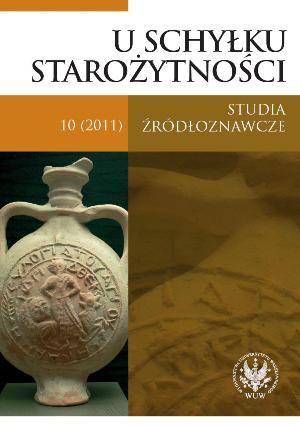CZY LEGENDĘ TEKLI OCENZUROWANO? ŚWIADECTWO TERTULIANA O APOKRYFICZNYCH DZIEJACH PAWŁA ( DE BAPTISMO 17,5)
WAS THECLA'S LEGEND CENSORED? TERTULLIAN'S TESTIMONY ON THE APOCRYFICAL ACTS OF PAUL ( DE BAPTISMO 17,5)
Author(s): Joanna RączkaSubject(s): History
Published by: Wydawnictwo Naukowe Sub Lupa
Keywords: APOKRYFY; ŚWIADECTWO; TERTULIAN
Summary/Abstract: This article investigates some traces of an original diversity in Christian attitudes towards women’s place in the Church. One of these traces is a passus in Tertullian’s homily On the baptism 17,5, where the author strives against any attempts to treat a part of the apocryphal Acts of Thecla as an argument for an empowerment of women to catechize and baptize. His fierce attack on these writings seems however disproportionate to its contents available nowadays, which could hardly act as a piece of evidence for Paul having authorized females to perform aforementioned duties. Two hypothesis have been proposed as an explanation for this divergence. According to the first one, some scenes or expressions had been expurgated by copyists worried about an unorthodox interpretation and resultant misuse of the Acts of Thecla. At least two facts speak in favor of this hypothesis: the text ends abruptly, the last sentence leaving the impression of being a fourth-century interpolation, and the apostolic aspect of Thecla’s legend, poorly illustrated in the present ATh, was significantly elaborated in Byzantine homilies and other late Christian writings, which corresponds with Thecla’s cult in the official liturgy as a female apostle authorised by Paul to teach and baptize. According to the second hypothesis, the aforesaid abuse of Thecla’s example should be understood as a manifestation of an ancient reader’s imagination which tended to associate the very scanty mention in Thecla’s Acts with contemporary practices on the edge of heterodoxy, such as widows’ initiation of catechumens berated in Syrian Didascalia or women’s significant role among Montanists in Asia Minor, the cradle of Thecla’s story. Coupled with a “teaching-baptizing” concept-cluster evoked by Paul’s final instruction for Thecla in the apocryphal narrative, it made the Acts more meaningful than they were at first in their author’s intention.
Journal: U schyłku starożytności - Studia źródłoznawcze
- Issue Year: 2011
- Issue No: X
- Page Range: 111-130
- Page Count: 19
- Language: Polish

